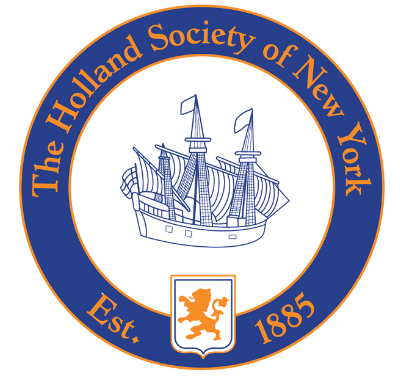Annual Dinner Honors Herbert C. Hoover
de Halve Maen , January 1948
One of the most successful of all the sixty-three annual dinners of The Holland Society of New York was held on the Starlight Roof of the Waldorf-Astoria Hotel, this city, on Thursday evening, November 20.
The highlight of the occasion came when the Society’s Distinguished Achievement Medal award was presented to former President Herbert C. Hoover, the Nation’s only living past Chief Executive. Nearly four hundred members and guests stood in tribute to his humanitarian efforts as Dr. Harold O. Voorhis, the Society’s president, first pinned the decoration to Mr. Hoover’s breast and then handed him an embossed certificate eulogizing his career as an engineer, statesman, and worker for the relief of world suffering.
President Voorhis introduced Rev. Dr. Ernest R. Palen, dominie of the Society, who outlined the career of former President Hoover from his boyhood on a farm in the West to an eminently successful engineer at the outbreak of World War I, when he first turned his genius as an organizer and administrator to relief problems. Dr. Palen told of Mr. Hoover’s service as a cabinet officer in two Administrations, his election as president, his survey of world conditions after the recent war, and his present task as chairman of President Truman’s committee on reorganization of Government departments.
A note of optimism for better times in a democratic world was sounded by Mr. Hoover in his address which followed presentation of the award. He stressed a growing opposition to Soviet tactics behind the iron curtain, as evidenced by recent events, as an indication of a restiveness that ultimately will bring change.
“I cannot but believe,” the former President asserted, “that the Communist-ridden peoples will sooner or later throw off their chains.”
That there are some “rumblings,” he continued, was indicated by the “repeated purges.” His reference to the political house-cleanings in Bulgaria, Romania, and Hungary seemed clear to those attending the dinner.
Warning that fifth columns all over the world must be unceasingly combatted, he pointed out that as time went on these were meeting with less success.
“A year ago,” he said, “there were Communist ministers in the Cabinets of seven or eight governments outside the Iron Curtain; now they remain only in one or two such countries.”
He added that the constant exposure of Communists in this country was destroying the hopes they might once have had, and urged that above all we must help other countries combat their conspiracies.
“Our task is to avoid war between these two worlds,” he declared. “Every year we gain brings us nearer to the day when these monstrous regimes, like all their predecessors in history, will fall.”
Mr. Hoover voiced hope and faith despite “the great shadow which hangs over the future of the world—Russian communism.” Calling for a more positive attitude, he said that at the risk of being called a “Pollyanna,” he had hope for a brighter future.
“With this guarded fashion of rejoicing,” he went on, “let me say at once that considering the destructive forces let loose during the past ten years, we can be grateful that so much of western civilization survives. It has proved to be tough.
“We should deplore some of the moral consequences of war among the American people; but we do see them pouring out their substances to save the hungry and cold all over the world.”
While the accomplishments of the United Nations “may not be great,” Americans are demonstrating that “free enterprise is the only road to productivity,” he said, adding:
“Had we in this hemisphere yielded to the economic Utopias of either Eastern or Western Europe, I venture to say that hardly a ton of food or fuel would be moving overseas. Sooner or later the utopia-seeking nations will notice these facts and their peoples will resume the only road to freedom from hunger and cold.”
Only the free enterprise countries, he said, are free from starvation and cold, and 95 percent of all goods for relief of Europe and Asia are coming from the “high productivity” of these countries. Presentation of the award and the address of former President Hoover were prefaced by the introduction of Dr. E.N. van Kleffens, Ambassador from The Netherlands to the United States. Making his first appearance at a Society function as successor to Dr. Alexander Loudon, he quickly drew applause by the sincerity of his response to traditional toasts which were offered to Her Majesty Queen Wilhelmina and President Harry Truman.
Ambassador van Kleffens outlined the efforts his countrymen are making to regain postwar economic improvement through work and thrift. He turned then to the situation in the Dutch East Indies and skillfully traced the course pursued by his government in seeking to arrive at a proper solution of the troubled conditions. The factions seeking power by fomenting disorder represent about five percent of the population in the colonial empire, he declared, and free elections are not possible at present to determine the will of the people, who are inarticulate through fear of retaliation. He expressed the hope that it would be possible to report at the next annual dinner that peaceful settlement has been attained.
The Very Reverend Edwin van Etten, Dean of the Cathedral Church of St. Paul and vice-president of the Society for New England, spoke ably on the sturdy qualities of the beaver and compared them to those of the Dutch. His address is printed in full on a following page in De Halve Maen.
Dr. Voorhis was a delightful and most efficient toastmaster. He drew frequent applause by the eloquence of his introductory remarks and humorous sallies.
The honor guests met officers and trustees of the Society at a cocktail hour which preceded the dinner.

